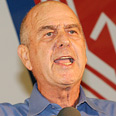
Israeli minister warns Palestinians of 'holocaust'
By stepping up Qassam rocket attacks on Israel 'Palestinians will bring upon themselves a bigger holocaust because we will use all our might to defend ourselves,' says Deputy Defense Minister Vilnai says. Hamas in response: We are facing new Nazis
Deputy Israeli Defense Minister Matan Vilnai said on Friday the Palestinians would bring on themselves what he called a "bigger holocaust" by stepping up rocket attacks on Israel from the Gaza Strip.
"Holocaust" is a term rarely used in Israel outside discussions of the Nazi genocide during World War Two. Many Israelis are loathe to countenance using the word to describe other contemporary events.
Israeli air strikes on the coastal territory, controlled by Hamas Islamists, have killed at least 32 Palestinians, including five children, in the past two days.
Israel said it was responding to rocket fire by Gaza militants, which killed one Israeli in the southern border town of Sderot on Wednesday, and it threatened to launch a larger-scale offensive unless the barrage stopped.
"The more Qassam (rocket) fire intensifies and the rockets reach a longer range, they (the Palestinians) will bring upon themselves a bigger holocaust because we will use all our might to defend ourselves," Vilnai told Army Radio.
Hamas official Sami Abu Zuhri said of Vilnai's comments: "We are facing new Nazis who want to kill and burn the Palestinian people."
Israeli Prime Minister Ehud Olmert has so far been wary of launching a major ground offensive, which could incur heavy casualties and derail US-backed peace talks with Palestinian President Mahmoud Abbas. But domestic pressure is growing.
Defense Minister Ehud Barak sought to prepare the way for an offensive by sending confidential messages to world leaders, including US Secretary of State Condoleezza Rice, who plans to visit the region next week.
"Israel is not keen on and rushing for an offensive, but Hamas is leaving us no choice," Barak told the leaders, according to Israel's mass circulation daily, Yedioth Ahronoth.
'Israel will seek them out'
Security sources were quoted by both Israel Radio and Army Radio as saying that a major operation was being prepared but was not yet imminent. A senior member of Olmert's centrist Kadima party, Tzachi Hanegbi, said the army should prepare to topple Hamas and capture areas used by militants to fire the rockets.
Israel pulled its troops and settlers out of the Gaza Strip in 2005 but still maintains control of the territory's air space, coastal waters and major border crossings.
Hamas has raised the stakes in the confrontation by using Soviet-designed Grad missiles, more powerful and accurate than improvised Gazan Qassams, to strike deep into Ashkelon, a major southern Israeli city of 120,000 people.
"Those who fire rockets at Israeli civilians will find that Israel will seek them out and neutralize them and their rocket launching squads," Israeli spokesman David Baker said.
Israel says it can maintain parallel tracks with the Palestinians, one aimed at breaking Hamas's hold on Gaza, and the other aimed at reaching a statehood agreement with Abbas, whose Western-backed Fatah forces were routed from Gaza last June by Hamas, which receives Iranian support.
Although Abbas and his secular Fatah faction remain deeply hostile to Hamas, the president and his West Bank-based government have publicly criticized Israel for its military actions and for threatening to kill Hamas political leaders.
"The Israeli government ... aims to destroy the peace process," Abbas' spokesman, Nabil Abu Rdainah, said in a statement on Thursday. Shunned by the West for refusing to renounce violence after beating Abbas' Fatah faction in a parliamentary election two years ago, Hamas says it would cease fire if Israel stopped its military operations in Gaza and the occupied West Bank.
Hamas is also demanding an end to the Israeli-led blockade that has cut supplies to the territory's 1.5 million people.










